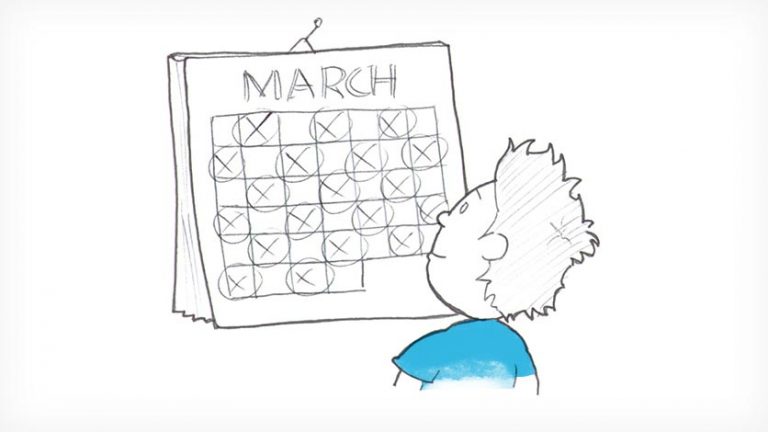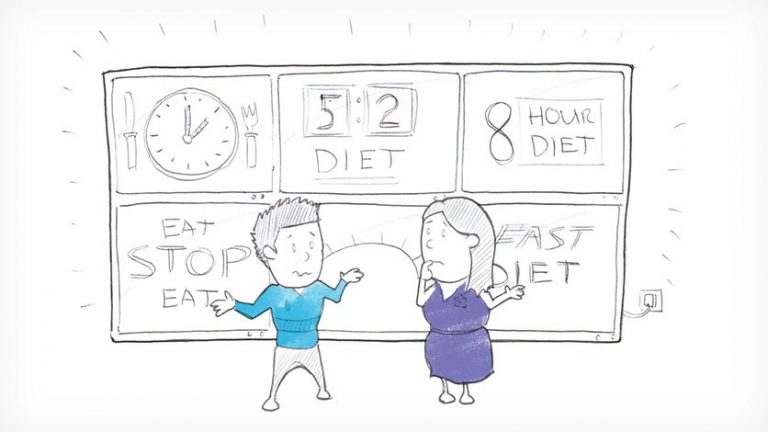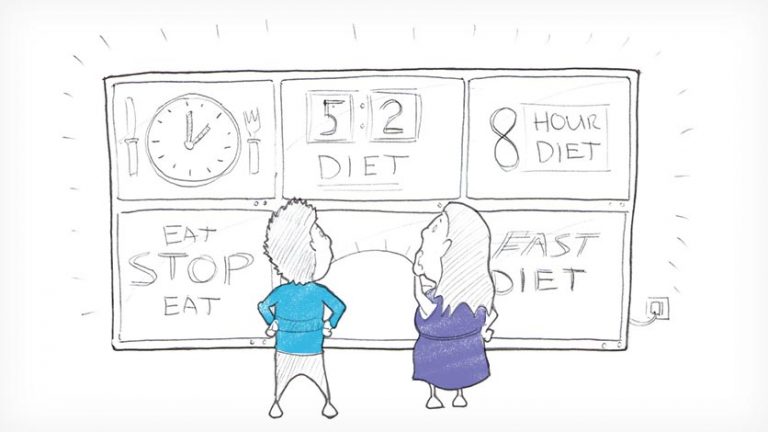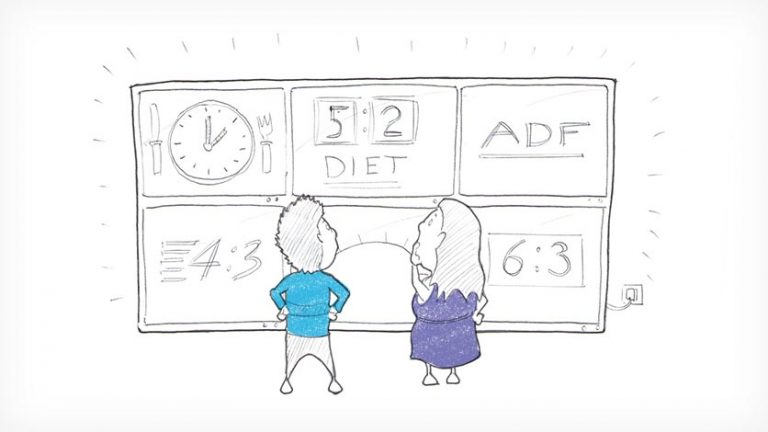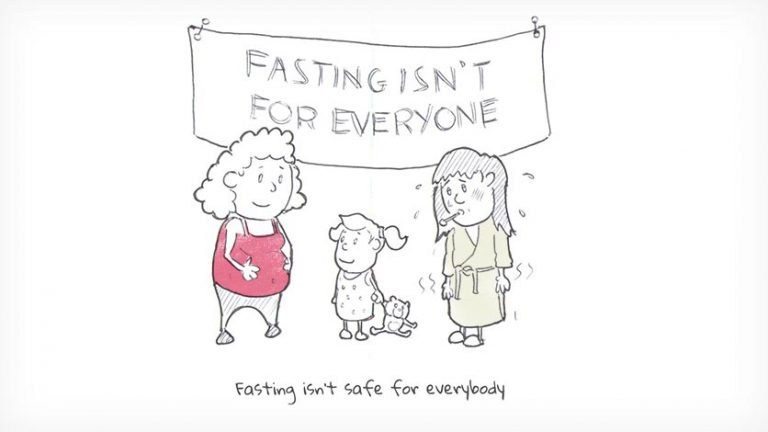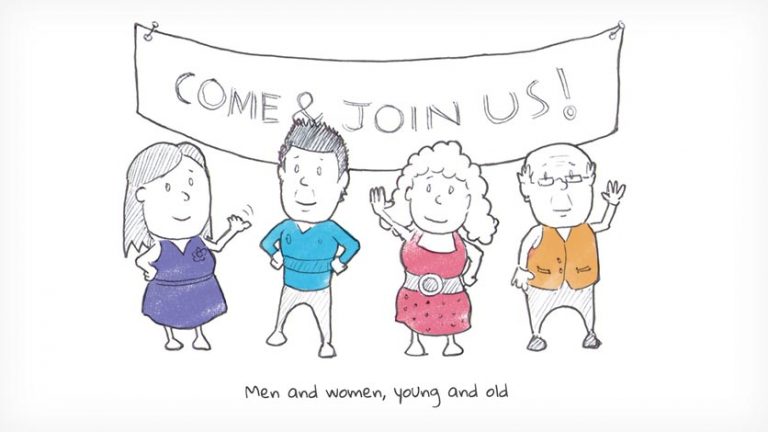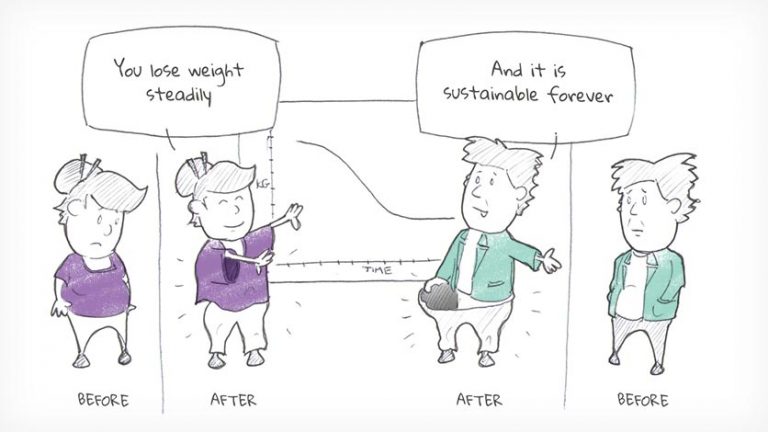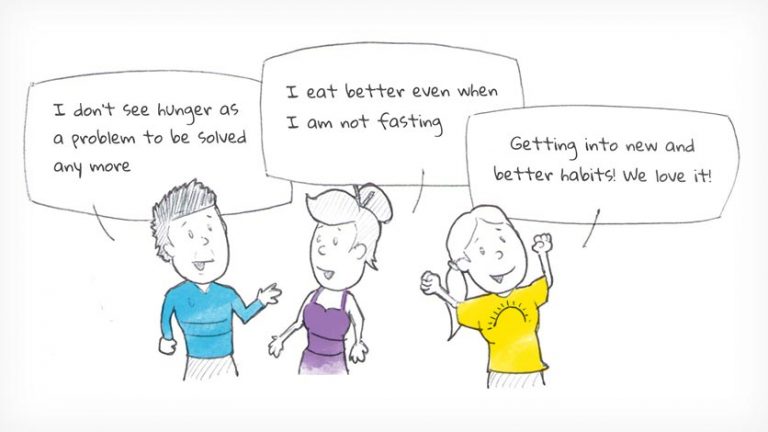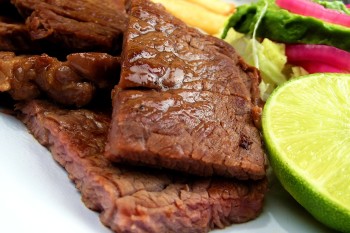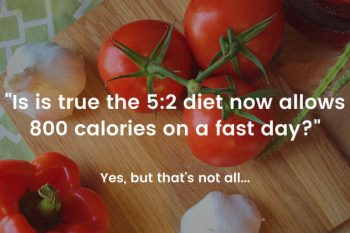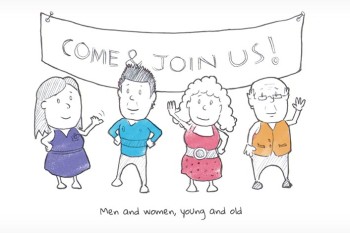Fasting is a great way to lose weight!
It works steadily – perhaps not as rapidly as other diets – but by learning how to do intermittent fasting your weight losses will be sustainable and permanent.
Fasting is not like other diets; it does not take over your life. You do not need to spend all your time counting calories, and you can eat the food you love on non-fast days. It’s not even really a diet, it’s a new Way of Eating.
Unlike other diets, fasting is easy, flexible and sustainable.
How quickly will I lose weight on the 5:2 diet or other fasting patterns?
Based on scientific research (unlike most diets), intermittent fasting in various forms has proved an effective way of losing weight. Depending on your choice of fasting method, you can expect to lose around 0.5kg (1lb) per week. Some weeks you might lose more, others less, but over time down it will go.
How does fasting for weight loss work?
There are five reasons that intermittent fasting is so effective for sustainable weight loss:
1. When you’re fasting you are reducing your calorie intake. Even though you eat normally the rest of the time, your total calorie intake will fall – so you will lose weight. This is obvious, of course!
But there is actually more to it than that.
2. Surprisingly, the periods of fasting do not make you more hungry, instead your appetite on non-fast days is decreased, so you end up eating less on those days as well.
3. The time spent fasting teaches you to understand the difference between real hunger and eating due to boredom, emotion, or just because it’s time to eat, so you’ll find that you’ll snack less – even on non-fast days.
4. Because you can still eat your favourite foods when you’re not fasting you won’t feel that sense of deprivation that comes with diets where many foods are forbidden. This makes the fasting Way of Eating much easier to sustain.
5. Fasting is more effective than simply eating fewer calories 7 days a week, because when you are fasting your body burns fat to a much greater extent than previously. Compared with other diets, intermittent fasting shrinks more fat with less muscle loss.
Learn more about the science of fasting
Keeping slim by fasting
Once you have reached your target weight, your fasting method can be adjusted to keep you at your target. Many people move from 5:2 to 6:1, for example. What’s more with your new skills, you’ll be able to enjoy meals out, vacations and celebrations without worrying about whether you’ll gain any weight; just increase your fasting for a short time and any gains will quickly disappear!
Learn more about fasting for weight maintenance
The FastDay community
Many members of the FastDay forum have been fasting for well over a year. A visit to our free forum will give you the chance to connect with thousands of other successful fasters and see for yourself how much easier it is to lose weight by fasting than by all those old fashioned ‘eat less, move more’ diets.
What’s more, you can easily continue with fasting to keep the weight off and to maintain the health benefits.
Fasting success stories
The FastDay forum has a host of inspirational stories from people who had struggled for years with their weight but through fasting found they could not only reach a healthy weight but maintain their weight loss: something they had never been able to do before. Here are some of their stories:
Sue.Q’s story:
“This time last year I gave all my “smaller” clothing away to charity shops, given up on the weightloss game and was feeling very low indeed, had a really bad hip/back problem resulting in physio, I wasn’t housebound but very nearly because of my foot and leg swelling problem which early in the new year got to a “severe” state being only able to wear men’s fully adjustable sandals because nothing else would be anywhere near fitting and my life was horrendous physically mentally and painfully 😯
I sent for the book and thought I can do 2 days each week on 500 calories, got started right away without any planning whatsoever.
I found it very easy to do so immediately did 3 days each week, resulting 4:3 which I didn’t even know existed at that point, then a couple of weeks later I found this forum, learning far more from everyone’s experiences.
I will never look back on any of those decisions at all, plus I actually do enjoy my fastdays.
After 8 months I’ve lost 50 lbs, bought a complete new wardrobe of “interim” clothing, dropped down a group on my BMI, dropped 3 sizes in my new clothes. The icing + cherry on the cake is the VAST change in my legs and feet I’m now wearing all my (women’s!) sandals, shoes and boots that were still tucked away in the spare room.
I really can’t put into words the difference this has made to my life, and as usual when I re-live this memory like now I’ve tears in my eyes. I’ve always said on this forum that this way of eating has truly saved my life and it has because there’s only one person who knows (me) exactly the stage I’d got to and the point I was close to.”
Nora’s story
“I catch sight of myself in a shop window: Instead of seeing a plump lady, looking away quickly and sucking my tummy in, I am amazed, jubilant, happy and sneak another look. Here’s how:
Last summer, I saw the BBC Horizon program and the health benefits were an immediate attraction as I have a very close relative who is insulin dependent, and the idea of only counting calories on 2 days a week made it seem easy enough. I started with the intention of going for the long haul.
Very soon, I found I was not overly hungry on fast days and was definitely enjoying the sense of discipline and of being back in control. At first, I nibbled the evening before a Fast Day and thought about food constantly but this eased off fairly quickly and I began to lose the habit of snacking on non-fast days, too. I shared my calories between 12 noon lunch and 7pm dinner and, as I have always struggled to enjoy breakfast on a daily basis, I started to miss this meal out every day. (I posted a comment and Dr M emailed me back to say the necessity for breakfast is a myth and he is doing more research. Excellent support.)
In March, I reached my target weight and although I still had a bit of plumpness around my middle, I planned to move onto 6:1 and see how my body redistributed things. But before I could establish a routine, I found that even without any fast days, I was still losing a little weight every week and my other stats were also reducing. So the 7 hour eating window obviously does it for me. Others have posted similar benefits.
Back from holiday and of course I had put a few pounds on (oh, the pasta, the ice-cream) but a return to the 7 hour eating window meant that after 2 weeks, I was back down to the weight I was before I went away. And I have a complete new wardrobe of clothes from the back of the wardrobe that now fit again, for free.
Today is my 65th birthday. I weigh 127 lbs, have a 29 inch waist, a 27.3% fat ratio, a 20.2% BMI. I feel good and am hoping if not for more years, to be healthier, fitter and more able to enjoy the years I have left.”
natsw’s story
“I have had a battle with my weight from my teens onwards. In truth, looking back, I didn’t really have a problem in my teens but I felt I did and that made it all the easier to let the pounds pile on thereafter. I have tried so many diets I can’t remember them all. Ten years ago, in my early thirties, I lost a lot of weight after following a “Zone” type diet but developed hair-loss and stones in my gallbladder which resulted in its removal. From then on I decided that diets and me were finished. Twenty years of misery was enough. I felt I was living proof that diets didn’t really work long-term and after the traumas of gallbladder attacks, then the operation (followed by another trip to A&E), I just wanted to be well.
So that was it. I did stop dieting. And after a while I stopped worrying about my weight. I wouldn’t say I was happy about my weight but I decided that as I feminist I wasn’t going to be defined by my clothing size. The fact I had a partner who always loved me and found me attractive didn’t hurt. I started to realise how boring people were when they were dieting – women beating themselves up and talking about being “bad” – I felt very happy not to be part of their number any more. Then I started reading about the 5:2 Diet. What really appealed to me were the health benefits. Losing weight was not my reason for starting: I just wanted to be healthier. I didn’t tell friends about it, I just got on with it.
One year on and I couldn’t be happier that I decided to give 5:2 a go. I undoubtedly feel healthier, less short of breath, less tired but I have also lost 3 stone. It may not have been my motivation for starting but it was certainly a welcome side-effect! It hasn’t all been smooth going. I’ve regularly had weeks (sometimes 3 or 4) where I didn’t lose a thing, or even put on a pound or two, but through it all I’ve stuck with it and slowly the weight has come off. I’ve never been tempted to fast more than two days a week and on non-fast days I eat completely normally, including eating cakes and biscuits if I want them. For me that has been the key. How could I even think of giving up when five days a week I eat whatever I want? Of course my appetite has changed – I don’t want to eat the portions I used to – but I don’t feel like I’m on a diet.
The single biggest thing that has changed is my attitude to food. I don’t obsess about it and I don’t get into a panic about not having access to food all the time and that goes for fast days as well as non-fast days. On every other diet I have ever done I become fixated on food: what can I eat when? How many calories is this thing? If I eat that now what will that mean for later. On fast days it’s completely different. What I can eat is so limited I just plan it in advance and don’t worry about it on the day.
I’ve spoken to lots of people who have given up 5:2 because the weight loss is too slow. But now one year on they are all still struggling to stick to diets and I am 3 stone lighter. I don’t mean to sound smug but this is the first time in my life that I’ve really felt that this is a way-of-life rather than a diet. I don’t find myself calculating how many pounds I will have lost by a certain date and I don’t long for it all to be over so I don’t feel in denial. I hope I don’t sound too melodramatic when I say that I think 5:2 has changed my life. I know that my weight-loss will likely slow down (it already has) but I will stick with it and continue to reap the other benefits while hoping that, however slowly, the weight will continue to come off. The main thing is that it just feels like a massive relief and that is probably what I like best about 5:2.”
TedE’s story
“After 1 year of 4:3:
– 39.8kg, 87.8lb, 6 stone 3.8lb gone (or as a friend of mine put it, I’ve lost a 12 year old);
– BMI down by 12.28 (49.07 to 36.79 or 25%);
– My day to day clothes are even more comically loose. I threw out some big items, but still haven’t wholesale replaced my wardrobe, just wearing some older stuff along with some of my biggest stuff (in this regard, my belt is my best friend);
– Clothes that fit well in 2001 (when I was finishing High School) are now slightly too big.
The second lot of 6 months has been characterised by long periods of plateau followed by sudden large losses (including around 4 kgs in one week). Funnily enough the plateaus seem to occur as I’m approaching and around a milestone (ie 130kgs & 120kgs, 30kgs lost & 40kgs lost) though I have no idea why, presume this is coincidence. I understand plateau is fairly common around the 6-9 month mark of any dietary intervention so not terribly concerned, just a bit frustrating. Just hoping the next 6 months are a lot faster.
I feel great. Even though I’m still quite big, I feel quite light on my feet and energetic. I also feel a lot stronger and like I have more endurance.
Fasting is now so easy I usually don’t eat at all on fast days and sometimes don’t break the fast at breakfast the next day, carrying on until lunch time if I don’t feel hungry.”

